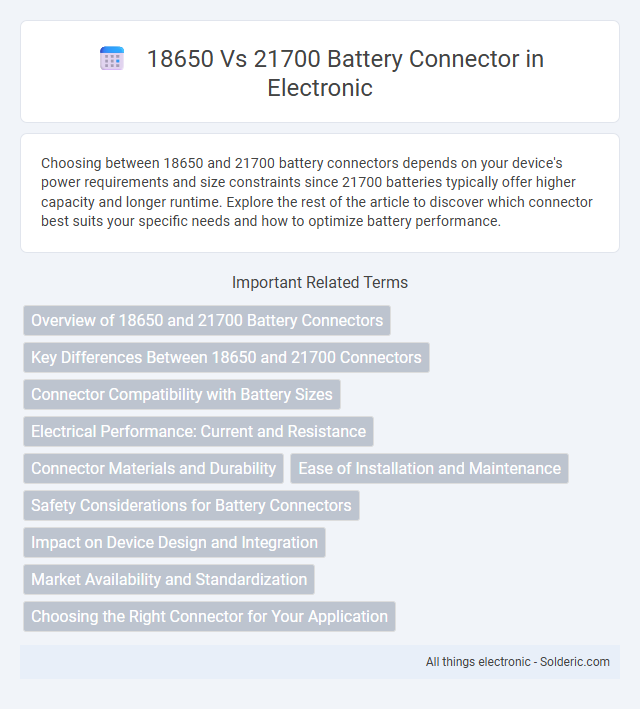Choosing between 18650 and 21700 battery connectors depends on your device's power requirements and size constraints since 21700 batteries typically offer higher capacity and longer runtime. Explore the rest of the article to discover which connector best suits your specific needs and how to optimize battery performance.
Comparison Table
| Feature | 18650 Battery Connector | 21700 Battery Connector |
|---|---|---|
| Battery Size | 18mm diameter, 65mm length | 21mm diameter, 70mm length |
| Current Rating | Typically 10-20A | Typically 15-30A |
| Connector Type | Flat or Spring-loaded contacts | Flat or Spring-loaded contacts |
| Voltage Compatibility | 3.6V - 3.7V nominal | 3.6V - 3.7V nominal |
| Application | Smaller devices, laptops, flashlights | High-drain devices, power tools, e-bikes |
| Connector Size | Smaller; fits compact designs | Larger; requires more space |
| Connector Durability | Standard wear resistance | Enhanced durability for high current |
| Thermal Management | Basic heat dissipation | Improved heat dissipation features |
Overview of 18650 and 21700 Battery Connectors
18650 and 21700 battery connectors are designed to accommodate the distinct dimensions of their respective cylindrical cells, with 18650 connectors tailored for 18mm diameter by 65mm length batteries, while 21700 connectors fit larger 21mm diameter by 70mm length cells. The connector specifications prioritize secure electrical contact and thermal management optimized for the higher capacity and discharge rates of 21700 batteries. Compatibility and robust construction for both connector types ensure efficient current transfer in applications including electric vehicles, power tools, and energy storage systems.
Key Differences Between 18650 and 21700 Connectors
18650 and 21700 battery connectors differ primarily in size and current handling capabilities, with 21700 connectors designed to accommodate larger diameter and higher capacity cells, supporting greater continuous discharge rates. The 18650 connectors are smaller and typically used in devices with lower power requirements, while 21700 connectors provide improved thermal management and durability for high-drain applications. Your choice between these connectors should consider device compatibility and the electrical performance needed for optimal efficiency and safety.
Connector Compatibility with Battery Sizes
Battery connectors designed for 18650 and 21700 cells differ primarily in size and contact arrangement, impacting compatibility with their respective battery sizes. Connectors for 18650 batteries are smaller to fit the standard 18mm diameter and 65mm length, while 21700 connectors accommodate larger cells measuring 21mm in diameter and 70mm in length. Ensuring your connector matches the battery size is crucial for secure connections, optimal performance, and safety in electronic devices.
Electrical Performance: Current and Resistance
The 18650 and 21700 battery connectors differ significantly in electrical performance, with the 21700 connector supporting higher continuous current due to its larger contact surface area and lower internal resistance. Lower resistance in the 21700 connectors reduces energy loss and heat generation, enhancing efficiency and longevity of your power system. Choosing a 21700 battery connector can improve current delivery and overall electrical performance in high-demand applications.
Connector Materials and Durability
18650 and 21700 battery connectors are commonly made from high-conductivity materials such as nickel-plated steel or copper alloys to ensure efficient power transfer and corrosion resistance. The 21700 connectors often feature enhanced durability due to their larger size, supporting better mechanical stability and heat dissipation compared to 18650 connectors. Choosing the right connector material directly impacts your device's performance and longevity by minimizing voltage drops and wear over time.
Ease of Installation and Maintenance
The 18650 battery connectors generally offer easier installation due to their smaller size and widespread compatibility with existing devices, making them suitable for quick replacements. In contrast, 21700 battery connectors require more robust connectors designed to handle higher currents, which can complicate installation but improve power delivery and durability. Maintenance for 18650 connectors is simpler because of their standardized designs and abundant replacement parts, whereas 21700 connectors often demand specialized tools and careful handling to maintain optimal performance.
Safety Considerations for Battery Connectors
Safety considerations for 18650 vs 21700 battery connectors focus on ensuring secure electrical contact to prevent short circuits and overheating. Proper insulation and high-quality materials reduce risks of corrosion and electrical faults, which are vital for both battery types' performance and longevity. Choosing connectors designed for your specific battery size enhances operational safety and maintains battery integrity.
Impact on Device Design and Integration
18650 battery connectors offer compactness suited for smaller devices, allowing for lightweight and space-efficient designs, while 21700 connectors accommodate higher capacity cells, leading to longer device runtimes but require larger battery compartments. The increased diameter and length of 21700 connectors necessitate reinforced contact points and modified holder mechanisms to ensure reliable electrical connections and thermal management. Device integration with 21700 connectors often demands redesigns of internal layouts to optimize space utilization and maintain structural integrity under higher power loads.
Market Availability and Standardization
The 18650 battery connector dominates market availability due to its widespread use in laptops, power tools, and electric vehicles, benefiting from extensive standardization across manufacturers. In contrast, the 21700 battery connector, increasingly favored for higher capacity and energy density, is less prevalent but gaining traction with emerging standards in newer electric vehicle and energy storage applications. Your choice between the two should consider compatibility with existing equipment and the evolving market trends favoring 21700 connectors in high-performance devices.
Choosing the Right Connector for Your Application
Selecting the right connector for 18650 and 21700 batteries depends on your device's voltage and current requirements as well as the physical space available. 21700 batteries typically have a higher capacity and current rating, demanding connectors that can handle increased power without overheating or loss of efficiency. Ensure your connector choice matches the battery size and electrical specifications to optimize performance and safety for your application.
18650 vs 21700 battery connector Infographic

 solderic.com
solderic.com